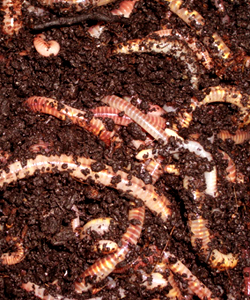Worms, eat my waste!
 Ethical Superstore spoke with Garden Organic – the leading authority on organic gardening – to find out just what’s involved in owning your own wormery. If this is something you’ve considered, but not sure whether you want a colony of worms in your life, this expert advice on the fascinating composting critters could jumpstart your love for them.
Ethical Superstore spoke with Garden Organic – the leading authority on organic gardening – to find out just what’s involved in owning your own wormery. If this is something you’ve considered, but not sure whether you want a colony of worms in your life, this expert advice on the fascinating composting critters could jumpstart your love for them.
Ethical Superstore: I’m thinking of getting a wormery – will worms recycle all my waste?
Garden Organic: Having your own wormery is perfect for composting kitchen waste, thereby reducing methane from landfill and simultaneously providing you with a rich compost – but don’t expect it to handle vast quantities of garden waste.
ES: How do the worms do it?
GO: Basically, they eat your organic waste, breaking it down in their stomach and produce worm casts – a very nutrient-rich compost. But you need a special species of worm, not any old garden worm can do this.
ES: How much kitchen waste can they eat?
GO: They can eat an incredible half a kilo of waste every 3 to 4 days in the summer.
ES: Will it require a lot of effort from me?
GO: No, but your worms will require attention. They need appropriate amounts of air, warmth, moisture and food to keep happy. Happy worms will feed, breed and produce lots of compost. Unhappy worms may try and escape.
ES: Appropriate air, warmth and moisture? Sounds complicated.
GO: Not really. In a nutshell, they need to breathe, so get a wormery with a large surface area. And they like it damp but not waterlogged – professional wormeries will have good drainage. Cold worms work slowly, and hot ones become tired, so, in winter put it in a warmer spot and in summer keep it out of direct heat. Simple.
ES: How often should I feed them?
GO: Little and often. Give them any sort of garden or kitchen waste provided it is not too big or too woody. You also need to feed your worms a balanced diet with approximately 25% dry ‘brown’ fibrous materials such as newspaper and 70% wet ‘green’ materials such as kitchen waste. So, it can be a good way of recycling some paper too.
ES: So they will eat everything from the kitchen?
GO: They will eat most organic waste including vegetables, egg shells, tea leaves, coffee grounds, burnt toast and fruit peelings, but avoid large quantities of citrus peel as this can be too acid.
ES: Should I build my own, or buy a professional wormery?
GO: Both options have benefits. Professional wormeries are often made up of several tiers to make collecting the finished compost easy, so it can be more convenient. Professional bins may also have a tap so you can drain off the liquid – which you can use as a plant food. And a professional wormery is quicker to get started, of course. If your home made one is very well designed though, it should function efficiently too.
ES: Does it require a lot of space?
GO: No, surprisingly little space. If you haven’t the room for a traditional compost bin, you could find that worm composting is just the thing for you.
ES: Is the worm compost any good?
GO: Yes. Worm compost is very nutrient rich – the nutrients from your waste are not lost by the breakdown process – and can be used as a general soil improver and plant feed. Containers and houseplants will benefit from an annual spring top dressing of worm compost too.
ES: Sounds perfect, but does it take long to get your compost?
GO: Worms will start eating when they are settled – so, after only a few months you’ll get your first compost.
The Can-O-Worms, a superior and innovative layered wormery, is available from Ethical Superstore with everything you need to get you started, priced £109.95.
Thanks to Garden Organic for their expert advice – formerly know as HDRA – the UK’s leading organic growing charity (Patron HRH The Prince of Wales). Garden Organic has been at the forefront of the organic horticulture movement for over 50 years.

